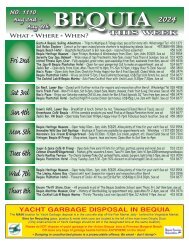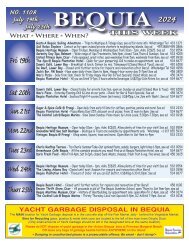Caribbean Compass Yachting Magazine - April 2021
Welcome to Caribbean Compass, the most widely-read boating publication in the Caribbean! THE MOST NEWS YOU CAN USE - feature articles on cruising destinations, regattas, environment, events...
Welcome to Caribbean Compass, the most widely-read boating publication in the Caribbean! THE MOST NEWS YOU CAN USE - feature articles on cruising destinations, regattas, environment, events...
Create successful ePaper yourself
Turn your PDF publications into a flip-book with our unique Google optimized e-Paper software.
Boat Work Tips for<br />
Cruising ‘Newbies’<br />
It’s said that some things never change.<br />
A version of this article was first<br />
published in the June 2005 issue of<br />
<strong>Compass</strong>, and if you’re planning to have<br />
work done on your boat this summer the<br />
advice here is just as valid today as it<br />
was then.<br />
I was prompted to write this article when a cruiser<br />
new to the <strong>Caribbean</strong> arrived in the marina in Puerto<br />
La Cruz, Venezuela, and announced he was getting a<br />
large list of things done to the boat while he was gone.<br />
We were amazed. Had he been in the <strong>Caribbean</strong> long?<br />
No, he was new. How well did he know the contractor<br />
he was going to leave the boat with? He didn’t.<br />
Gather information<br />
Since we have been full-time liveaboard cruisers in<br />
the <strong>Caribbean</strong> for almost five years, we have some<br />
advice and cruising tips we thought might help. The<br />
best advice is to do your homework thoroughly. Just<br />
as the three most important things in real estate are<br />
“location, location and location,” the most important<br />
things for successful cruising — and that includes<br />
having work done on your boat — are “research,<br />
research and research.”<br />
The best way to get information when you arrive at a<br />
new port is to walk the docks or dinghy over to other<br />
boats, introduce yourself, invite people to your boat for<br />
happy hour and then ask questions. It’s amazing how<br />
much information you will receive by just inviting<br />
cruisers over for cocktails. We have met some of our<br />
very good cruising friends and got lots of our cruising<br />
information this way — information that’s usually<br />
unbiased and accurate. Get a notebook and record all<br />
the answers, as there will be a lot of them! I could have<br />
written my own cruising book by now with all the<br />
information I have accumulated.<br />
When planning to have work done on your boat,<br />
research your destination, marina or boatyard.<br />
Research the local currency-exchange policy.<br />
Research available contractors before you commit any<br />
sum of money.<br />
Know your contractor<br />
Getting work done on your boat as a visitor in a<br />
foreign country is somewhat different from having it<br />
done in your home waters. At home, you probably<br />
used a contractor your boatyard recommended. If<br />
anything went wrong, the yard would step in. After all,<br />
customer loyalty is important in local markets and<br />
by Diane Exler Rudnick<br />
word about a bad experience certainly gets around the<br />
neighborhood. However, appreciation of customer<br />
loyalty may not be as prevalent in situations where<br />
many customers — i.e. visiting cruisers — are<br />
transients. So do your research and find out what<br />
recourse you, as a foreigner, will have if a contractor’s<br />
work is not done to your satisfaction.<br />
At home, wouldn’t you call the local Better Business<br />
Bureau to make sure the contractor has insurance<br />
and good references before you hired them? Of<br />
course! Then you should do the same here. Ask the<br />
local marine trades association for information, and<br />
ask several cruisers and local boaters for<br />
recommendations before you choose a yard or<br />
contractor. Go see the work that was done on several<br />
boats and ask the owners about it. Word of mouth is<br />
the best advertising and the best workers are often<br />
independent for that reason.<br />
‘Go see the work<br />
that was done on<br />
several boats<br />
and ask the<br />
owners about it.’<br />
When you do choose a contractor, get a contract and<br />
put everything in writing. Put dates, supplies, and<br />
details in it: for example, if the work is not done by a<br />
certain date, no further payment will be owed.<br />
Also, if work is not done to your satisfaction, do not<br />
count on it automatically being corrected the way you<br />
want it to be — your standards may be entirely<br />
different from the contractor’s. Don’t assume<br />
anything. Be very specific about what you want done,<br />
when and how.<br />
Being there<br />
I know other articles in the <strong>Compass</strong> have given this<br />
advice before but it apparently needs to be repeated.<br />
Five years ago, when we were new to the <strong>Caribbean</strong>,<br />
Ken on S/V Great White Wonder gave us the best<br />
advice we have ever gotten down here and we always<br />
follow it: “Don’t go home and expect that all your boat<br />
work will be completed in your absence.” It might not<br />
get done. And if it does, there is a chance it will not be<br />
to your satisfaction if you are not there to supervise.<br />
Unless you’ve worked with the yard, contractors and<br />
workers before, get great references, or hire a<br />
professional project manager, plan on watching all the<br />
work being done. If you don’t, at the very least workers<br />
may be tempted to “lime” — at the worst, on-the-spot<br />
decisions may be made that you do not agree with.<br />
Some boatowners buy materials themselves and give<br />
them out every day to be used under their own<br />
supervision. This way they know the materials used<br />
are the ones they chose, and that they are used they<br />
way they want them to be.<br />
Also think about this: Would you allow unfamiliar<br />
workers to enter your house at home and do work in<br />
it while you aren’t there? Of course not! Unless you<br />
know them well, do not allow workers down below<br />
without supervision. Unfortunately, petty theft does<br />
sometimes occur and if you have more than one<br />
unsupervised worker on your boat and items go<br />
missing, how will you know who took them?<br />
Notes on money and time<br />
Get a fixed price for the job, not an hourly rate. What<br />
incentive does the contractor have to finish a job<br />
quickly if he can rack up a per-hour cost?<br />
Keep up-front payments to a minimum. The more<br />
you pay up front, the less financial incentive for the<br />
contractor to finish the work on a timely basis. Some<br />
contractors will ask for money up front to buy<br />
supplies. Consider buying the supplies yourself (as<br />
mentioned above) and paying the contractor for labor<br />
on a weekly basis.<br />
“<strong>Caribbean</strong> time” is slower than US and European<br />
standards. When a Trinidadian says they will be with<br />
me “just now” I now know this does not mean<br />
immediately, as one might think — there is no time<br />
frame for this expression. The rest of the <strong>Caribbean</strong><br />
also works on “<strong>Caribbean</strong> time,” not the pace you<br />
might be used to back home. Get used to it — you are<br />
in the islands now, mon.<br />
So, what happened to the work the new cruiser<br />
wanted done in his absence? Well, the work should<br />
have been completed in about four months, but after<br />
six months was not done and was substantially over<br />
budget. No fixed price was given per job; the work was<br />
paid for on an hourly basis without the cruiser being<br />
present, and many of the jobs became unexpectedly<br />
expensive. In addition, the owner was not satisfied<br />
with much of the work.<br />
We hope this advice helps all you “newbies.”<br />
Remember, whether cruising or having boat work<br />
done, the best advice is to do as much research as<br />
possible in advance. Hopefully this will make for a<br />
more enjoyable experience. We hope you enjoy your<br />
time here as much as we have, but remember to avoid<br />
the pitfalls!<br />
Diane and Larry Rudnick cruised the <strong>Caribbean</strong><br />
aboard S/V Destiny.<br />
APRIL <strong>2021</strong> CARIBBEAN COMPASS PAGE 17<br />
Service Team<br />
« A to Z » SERVICE AGENT<br />
• Yacht Concierge 24/24 - 7/7<br />
• Electronic Clearance via Email<br />
• 4G/LTE & TVRO products & services<br />
• Project Management: Haul-Out, Maintenance<br />
• Gourmet provisions<br />
• Medical Turnkey Assistance & MEDEVAC<br />
Cell : +596 696 45 89 75 / Office : + 596 596 52 14 28 / mail : douglas@yachtservices.fr<br />
www.douglasyachtservices.fr

















